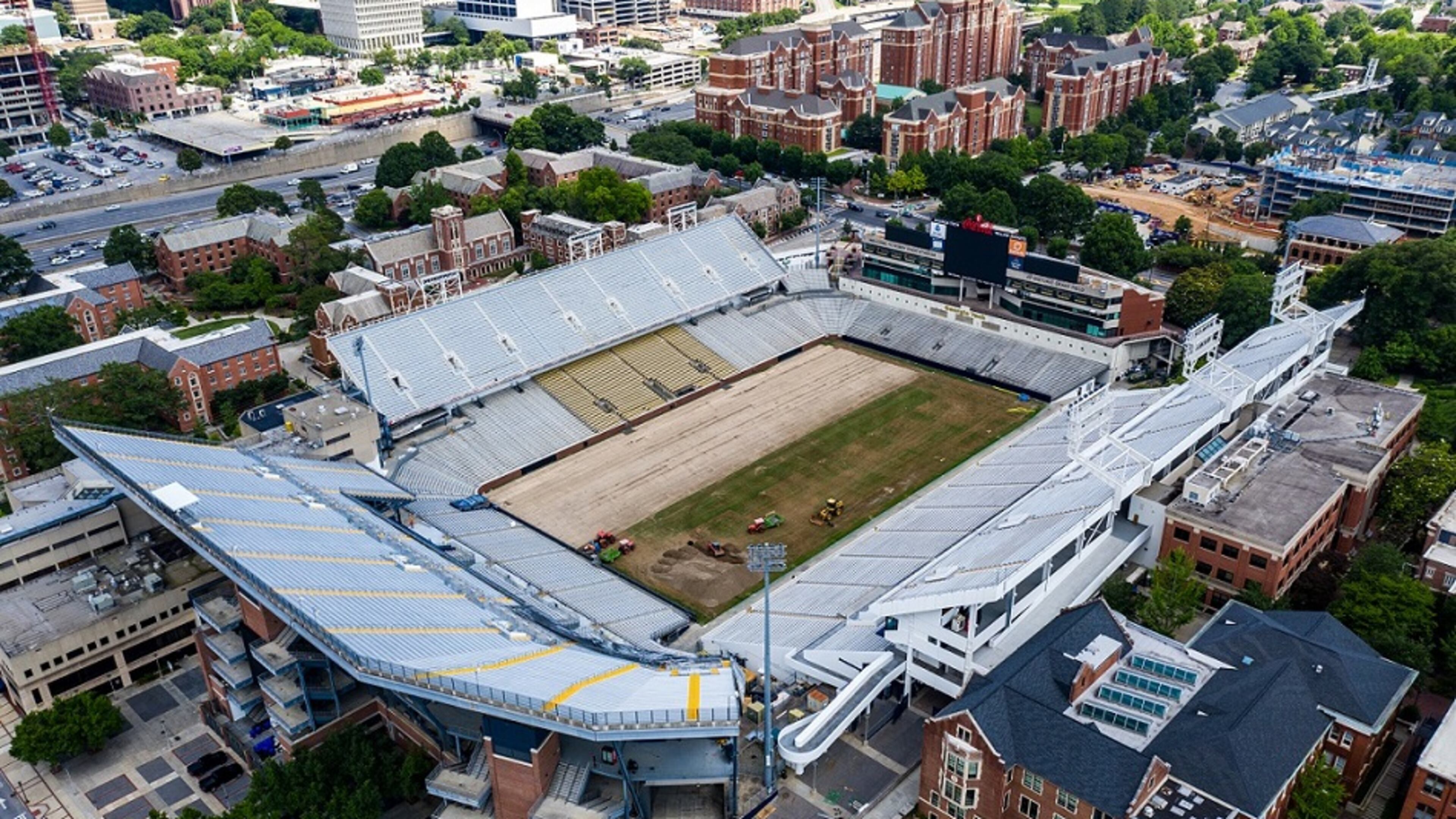In Bobby Dodd Stadium switch to artificial turf, disappointment and understanding

Jon DeWitt loved tending the field at Bobby Dodd Stadium with expert care for a number of reasons. He appreciated that it was a green space in the middle of a city. He was amused by the irony that he was exercising his passion for agronomy at an institution dedicated to technology.
And he was simply passionate about making the stadium’s grass the best that it could be, work that earned him the notice of Alabama, which hired him away to be its director of athletic grounds.
“I love grass,” DeWitt said Thursday from Tuscaloosa, Ala. “It’s my life. It’s what pays for me to live.”
His work with the field was so recognized that he was deluged with text messages earlier this week when his former employer announced that it was replacing the stadium’s grass with artificial turf.
“I put a lot of time into that field, so (I’m) a little disappointed, but life moves on,” DeWitt said.
DeWitt’s sentiments reflected those of at least two former players and several fans and alumni whose opinions were sampled about the transition to fake grass.
“I understand the financial reasons in terms of taking care of a grass field, I understand the practice reasons of being able to practice on it and have events,” said former Tech captain Roddy Jones, now an analyst for the ACC Network.
“But I grew up playing on grass, and that’s obviously my favorite field. And the surface alone, I stand by it – of all the fields I’ve been to across the country, it’s the best. I’m sad. I’m sad to see it go, but I completely understand why.”
Jones raved about Grant Field’s playing surface – the grass was cut low, the turf was firm, the field was level.
“The cut of the grass was perfect, and it was a fast field,” Jones said. “It was a fast grass field. I’m a little particular to it because of the memories we had there, but it was awesome.”
DeWitt passed the baton in 2016 to Chris May, whose work earned glowing reviews from Atlanta United players when the club played the first nine home games of its inaugural season at Bobby Dodd Stadium in 2017. That same year, the Sports Turf Managers Association named Grant Field its field of the year.
“I kind of understand why they’re (replacing) it,” said former Tech safey Jalen Johnson, now a program manager for a construction company in Atlanta. “I will say this – the natural grass was probably the best in college football.”
In the ACC, Tech will become the sixth team in the league to play home games on artificial turf. There’s also no shortage of nationally prominent teams who play on fake grass – Ohio State, Michigan, Texas and Oregon among them.
Among fans, there was disappointment of losing the aesthetic of surrendering the pristine field, one recognized as one of the best in the country.
“Part of the game-day experience is seeing the job that Chris May and his staff did with the field,” wrote Blake Thomas, a season-ticket holder, in an email. “There’s nothing like seeing that green grass and fresh paint on game day.”
Thomas, like other fans, recognized the financial implications of a field that will cost less to maintain and also the practical benefits of a non-grass field that Jones mentioned – being able to practice on it without concern for wearing it down and having other events on it, like revenue-generating concerts and other non-Tech sporting events.
“Maybe they can get another concert or two and help the budget,” Thomas additionally wrote.
Budget concerns have only increased since the decision was made in the winter to switch to artificial turf, following the announcement of two concerts to be held in the stadium this summer.
“In this day and age, money is important to an (athletic department) when trying to build a championship program,” season-ticket holder Jason Hill wrote. “To me, it’s a good decision. The way turf looks now, visually I don’t think the fans will notice a difference.”
“I like the natural grass personally, I guess it just has more of an authentic/nostalgic feel,” Cullen Nicholl wrote in an email. “I get that the maintenance costs are much lower with the turf, though. I just hope the players are happy with the change. They are the most important stakeholders, in my opinion.”
Both Jones and Johnson didn’t mind playing on plastic turf during their careers. It does get hot in warm temperatures, but Johnson said he felt faster on it. Jones noted that, given the proliferation of artificial surfaces at the high-school level, players are probably accustomed to it.
“I’m excited to see (the new surface), even though I hate to see the natural grass go,” Johnson said. “I’m right here in the middle. I understand it.”


